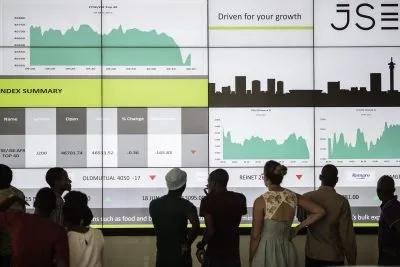Amid the optimism at the second of the African Prosperity Dialogues held at Aburi, Ghana, there were distinct notes of frustration from business leaders about the logistical barriers to cross-border trade.
Ebenezer Asante, MTN’s senior vice president of markets, was perhaps most succinct in his appeal to policymakers and regulators.
“The tyranny of sovereignty must end to allow proper trade and ease of doing business across West Africa. Technology continues to transform the way we trade, and we must leverage the immense opportunities it presents to trade within our borders. The tyranny of sovereignty is an impediment to progress because with our borders closed to each other, we cannot foster seamless trade. African countries must open their borders to each other to allow intercontinental trade.”
Business leaders would be hoping that their counterparts in government are paying attention to the calls from Aburi. The need to boost intra-African trade is now an article of faith among Africa’s leaders, but often this consensus is challenged by the harsh realities that businesses – small and large – face when they attempt to live out this credo. Much will have to change before the benefits of trade can be realised on the continent.
Take travel. Several speakers wondered at the challenges that they have to face when they travel from one country to the other. Ghana’s President Nana Akufo-Addo got in front of this when on the first day of the three-day summit, he hinted that Ghana would soon follow Rwanda and Kenya and offer Africans visa-free entry into the country.
“The government of Ghana is committed to ensuring visa free for all Africans travelling to our country and the process has begun to get the policy implemented this year, that is before I leave office,” the president said, while acknowledging that attendees from outside the country had had to procure visas to enable them to travel to the country.
Away from visas, people and goods also struggle to cross borders due to transport challenges. Solomon Quaynor, vice president for private sector, infrastructure and industrialization at the African Development Bank, said the bank’s quest to support “African champions” who can trade across borders would receive a fair boost from the completion of the Lagos-Abidjan corridor. “It would have a tremendous impact on businesses because 80% of West Africa’s GDP goes through that corridor,” he noted. For those travelling by air, travelling from one end of the continent often entails leaving it entirely and re-entering from elsewhere, often a European airport. For some, that can mean up to three days of travel to get from one end of the continent to the other.
Another challenge is payments. With 44 different currencies and currently disparate payment systems, traders can find themselves limited to their primary markets, with transactions, when they occur, undertaken outside the formal financial system.
Regional CEO of UBA West Africa, Marufatu Abiola Bawuah, said that when she designed an innovative system to enable traders to receive payments, she ended up facing extensive barriers, demonstrating the tension that exists between regulators and operators even as both share the common goal of boosting trade and financial inclusion.
“They insisted that before buying from Ghana, they [Burkinabe buyers] would need to convert their CFA into Euros before we would now have to find a way to bring that to the suppliers in Ghana,” she recounted.
A common view was that the implementation of the African Continental Free Trade Area requires these challenges to be fully and comprehensively addressed. Currently, intra-African trade accounts for a paltry 17% of the continent’s trade. By contrast, 68% of all European exports in 2023 were to countries on the same continent, while in Asia, the figure stood at 57%. Africa’s economic goals are firmly linked to boosting intra-continental trade, developing regional value chains and scaling up industrialisation.
All of which would require that goods, money and people are able to move more freely around the continent – a message that was sent loud and clear at this meeting.
Convened by the Africa Prosperity Network in conjunction with the African Continental Free Trade Area secretariat, the Africa Prosperity Dialogues are an attempt to focus the minds of decision makers on the practical steps that can be taken to reverse the dire narratives around the continent and to procure a consensus on how Africa’s wealth of opportunities can be fully harnessed into growth.
Want to continue reading? Subscribe today.
You've read all your free articles for this month! Subscribe now to enjoy full access to our content.
Digital Monthly
£8.00 / month
Receive full unlimited access to our articles, opinions, podcasts and more.
Digital Yearly
£70.00 / year
Our best value offer - save £26 and gain access to all of our digital content for an entire year!
 Sign in with Google
Sign in with Google 




